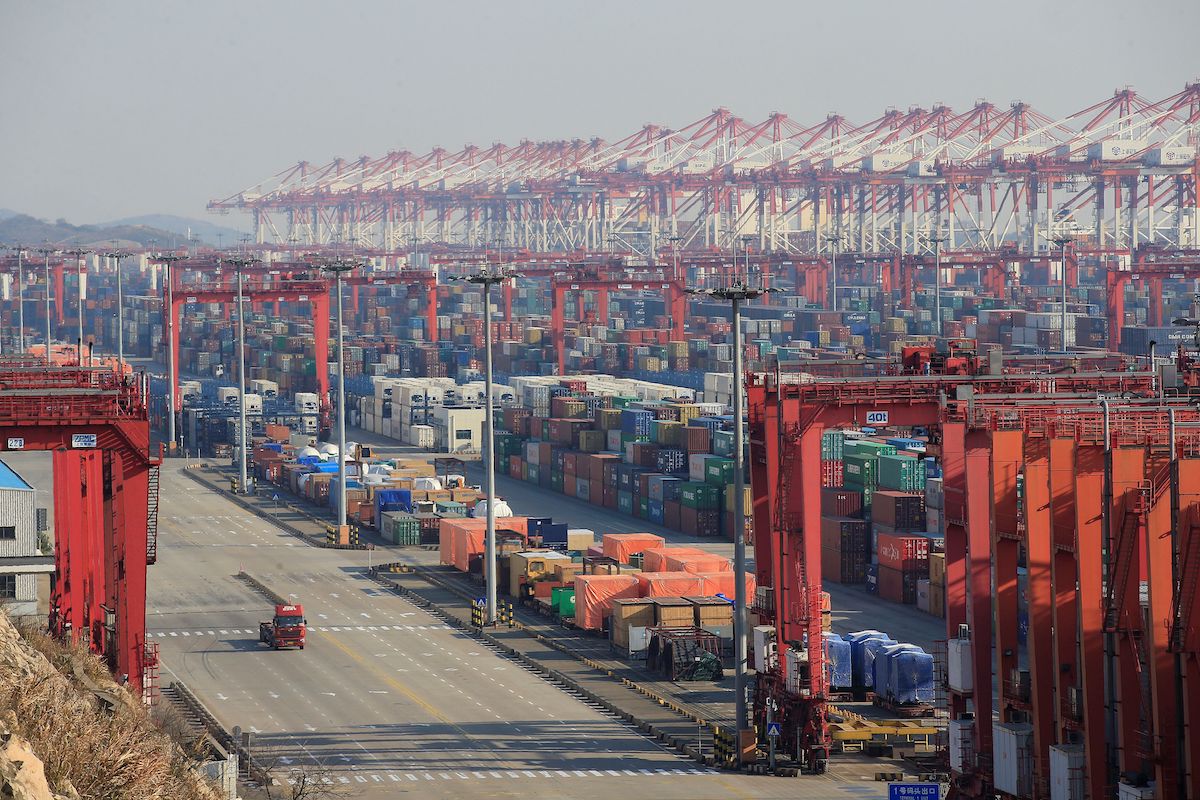FILE PHOTO: Containers are seen at the Yangshan Deep Water Port, part of the Shanghai Free Trade Zone, in Shanghai, China, February 13, 2017. REUTERS/Aly Song/File Photo
By Bloomberg News (Bloomberg) — The U.S. and China reaffirmed their commitment to the phase-one trade deal in a biannual review, demonstrating a willingness to cooperate even as tensions rise over issues ranging from data security to democracy in Hong Kong.
The two countries discussed steps China has taken, including ensuring greater protection for intellectual property rights and removing impediments to American companies in financial services and agriculture, the U.S. Trade Representative said. Both sides agreed to create conditions to push the deal forward, according to China’s Ministry of Commerce.
Resolving the trade war between the U.S. and China has emerged as a rare area of cooperation as the relationship sours on a number of other fronts. Yet Beijing is far behind where it needs to be to meet its promises to increase purchases of agricultural, energy and manufactured goods from the U.S.
China would need to buy about $130 billion in the second half of this year to comply with the original terms of the agreement signed in January, in which it agreed to purchase an additional $200 billion of American goods and services over the 2017 level by the end of 2021.
Taking stock
“The statement at least tells us that Trump’s administration still treasures the trade deal,” said Raymond Yeung, greater China chief economist with Australia & New Zealand Banking Group Ltd. “China’s buying of U.S. agricultural and energy products is still an attractive proposition before the presidential election. This suggests that we are not really seeing a full decoupling of the two economies.”
U.S. Trade Representative Robert Lighthizer and Treasury Secretary Steven Mnuchin spoke with Chinese Vice Premier Liu He Monday evening Washington time, according to the U.S. statement. The USTR later corrected that statement as they misspelled Liu’s first name, a mistake that drew attention on Chinese social media.
“The parties also discussed the significant increases in purchases of U.S. products by China as well as future actions needed to implement the agreement,” the U.S. said in its statement. Both sides also discussed enhancing macro-policy coordination, according to the Chinese readout.
Call Delayed
The call took place on the evening of the first day of the Republican National Convention, at which some speakers criticized Democratic Party nominee Joe Biden’s alleged friendliness to China.
President Donald Trump marked his official nomination for a second term with a speech that included a warning that China will “own” the U.S. if Biden wins the election in November.
Both sides had been expected to talk two weekends ago as part of a six-month review since the agreement, signed in January, took effect Feb. 15. But President Donald Trump said he canceled those plans because he’s unhappy with China over its role in the Covid-19 pandemic.
Prior to the talks, Bloomberg News reported that China would raise the issue of Washington’s recent crackdown on businesses including TikTok and WeChat. The topic was not mentioned in the statements from the two countries. TikTok on Monday asked a federal judge to block the Trump administration from enacting the ban on its app.
Some Progress
China has made some progress on its commitments. It modified regulations to allow imports of a variety of American farm and food products, while removing foreign equity caps in insurance, securities, and futures. It also lowered other financial market barriers and gave the green light to enterprises like American Express Co., MasterCard Inc. and Fitch Ratings Inc. to enter its market.
U.S. oil exports to China are set to reach a record next month, with about 19 tankers signing provisional bookings to load American crude for the Asian nation in September, according to shipping fixtures, which are subject to change. If all of them set sail, exports could total 37 million barrels, the most on record for a single month.
China’s customs has also strengthened a crackdown on counterfeits and released quarterly reports as set out in the agreement. The Supreme Court has issued a series of work guidelines and implementation plans on ensuring and improving legal enforcement of violations of intellectual property rights, while the National Intellectual Property Administration also published a work plan for strengthening IP protection in 2020 and 2021.
Trump has projected a more conciliatory tone than he did in early May, when he threatened in a Fox News interview that “if they don’t buy, we’ll terminate the deal, very simple.” In recent days he has sounded more satisfied with Beijing’s compliance with the trade deal even if he’s not about China’s handling of the coronavirus.
© 2020 Bloomberg L.P

 Join The Club
Join The Club











